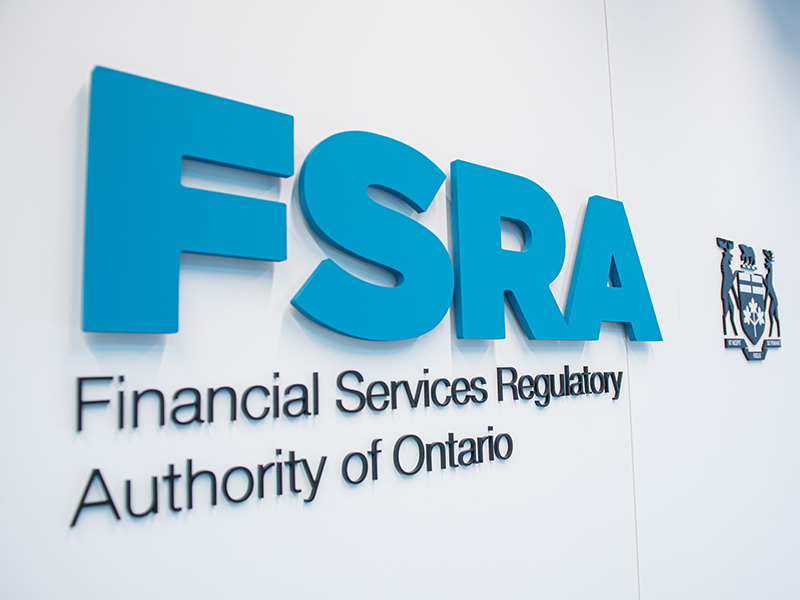
The Financial Services Regulatory Authority of Ontario (FSRA) has taken enforcement action against 65 life agents contracted with managing general agencies (MGAs) that operate under a tiered-recruitment model. The clampdown, which includes the sale of unsuitable universal life policies, is part of FSRA’s strategy to strengthen oversight of the sector.
On Tuesday the Ontario regulator released two reports detailing its actions and findings after it reviewed dozens of life agents contracted with Greatway Financial Inc., World Financial Group Insurance Agency of Canada Inc. and Experior Financial Inc.
These firms’ models tie compensation to agent recruitment, creating the potential to “focus on recruiting to a greater extent than agent suitability and customer needs analysis,” FSRA said in a report of its review of life agents working with the three MGAs.
At the time of the review — from May 2022 to April 2023 — 12,775 life agents were contracted with the three MGAs, representing 20% of licensed life agents in Ontario, the report said.
Of 130 life agents examined — none of whom were subject to previous regulatory action or otherwise risk-identified — 65 (50%) were cited with a total of 184 contraventions of the Insurance Act, related to insufficient disclosures, incomplete continuing education and misrepresentation to FSRA, among other contraventions.
Of the 65, 21 were subject to monetary penalties, and 39 of the cases were escalated to a regulatory discipline officer, the report said. Of the 39, more than one-third were subject to monetary penalties, and 12 were still under review as of May 31.
Other outcomes were letters of warning or business practices, voluntary surrender of licence and lapsed licensing.
Regarding sales practice–related outcomes, of 458 reviewed client files, 92 life agents (77%) were cited with 1,302 best practice issues, the report said. These included a lack of contemporaneous notes, disclosures, policy illustrations, and needs and risk assessments.
The regulator also found that the majority of life agents’ insurance policy sales in 2020 and 2021 were universal life (UL) — 56% and 57%, respectively.
The second report provided more detail about the distribution and sale of UL insurance at the three MGAs during the latest review period. Of 24 client files reviewed, in the majority of instances a UL policy was sold, FSRA found.
“Notably, 80% of the files did not demonstrate that UL policies sold were aligned with the customers’ needs or circumstances,” the report said.
Last year, FSRA ordered Greatway to retrain its agents after alleging that the MGA trained them to sell overfunded UL policies using an insured retirement plan.
Tuesday’s report said needs analysis was often trivial, flawed or no insurance need was identified. Further, retirement planning advice was incomplete or inaccurate, and policy illustrations were misleading or unrealistic.
Life agents recommended overfunded UL policies without considering a client’s existing high-interest personal debt, and the use of TFSAs and RRSPs were generally not considered as alternatives to the overfunded policies.
“Given that many of these cases involved young people with modest means, no savings and carrying high interest debt, the money being used to overfund UL premiums under the guise of helping them grow their savings may well have otherwise been put to better use through investment in TFSAs or by reducing their personal debt, among others,” the report said.
It stressed that UL is complex and potentially risky, and generally sold as a niche product to most insurers’ customers. For a UL strategy to work, one fundamental factor is “the agent selling the product must be ethical and thoroughly knowledgeable about UL and all its components, and able to customize the product to fit the customer’s overall financial picture, risk tolerance and overall financial plan,” the report said.
Without fundamental factors in place, “the effects can be catastrophic, resulting in policy lapse and a corresponding loss of all premiums paid into the plan, including overfunded amounts.”
In addition to enforcement, FSRA’s plan to address the issues identified in the reports include consumer education, new guidance, and, as previously announced, a proposed rule to enhance the MGA regulatory framework.
In an emailed statement on Tuesday, Greatway’s chief compliance officer Ray Burgher said the firm plays an important role recruiting new agents to Ontario’s middle market.
“In the period leading up to the recent report, we’ve implemented significant measures to ensure compliance and address concerns,” Burgher said. “These measures, including improved training and heightened agent supervision, aim to better serve our clients and align with regulatory expectations.”
Experior, which said it had not had an opportunity to review FSRA’s report prior to publication, stated that it has always followed industry standards and that its agents are properly licensed. It added that the only enforcement resulting in a fine was a CE deficiency for one agent.
According to the FSRA report, of the four Experior life agents escalated to regulatory discipline officers, one received a monetary penalty, one received a letter of warning, one resulted in a surrender of licence with conditions, and one was still under review (as of May 31).
World Financial Group did not immediately respond to a request for comment.
FSRA’s actions follow a report on the same MGAs from September 2022 that identified similar issues.
In an annual report, the regulator also identified best-practice deficiencies among higher-risk life agents. According to the report, the amount of monetary penalties handed down by FSRA’s enforcement unit soared to $224,000 in the latest year from $41,000 the year before. The penalties issued by regulatory discipline officers also rose to $14,500 from $10,000 in the prior year.